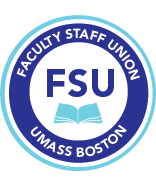The Point: Waging Peace at UMass Boston
11/15/2021
Greetings, Colleagues:
This week’s Point has a simple goal: we wish to heed the call made by Chancellor Marcelo Suárez-Orozco last Thursday on Veterans Day “to honor our veterans, past and present, and reflect on the meaning of their service and sacrifice.” But to do so we feel constrained to make some friendly amendments to the Chancellor’s framing of this service as an “unbroken narrative of duty” characterized by “love of country and selflessness in the name of the greater good.” We think it is possible to honor our veterans while also committing to a robust engagement with the realities of the United States’ military ventures.
We offer these reflections in the spirit of shared endeavor. The FSU Executive Committee remains energetically committed to the goals the Chancellor recently articulated of transforming UMass Boston into an “exemplary anti-racist…urban public university”—a challenge echoed in a recent communication from Provost Joseph Berger in which he posited an “anti-racist and inclusive agenda” as a “cornerstone of our approach to education.”
We were particularly struck by this part of the Chancellor’s Veterans Day message: “From the Vietnam War to Operation Enduring Freedom it is impossible to reflect on UMass Boston’s history and not grasp the immensity of the contributions our veterans have made.” This is true, as far as it goes, but read on: “Whether to protect the values and virtues we cherish, defend those unable to defend themselves, or advance peace and justice in the world, UMass Boston veterans have distinguished themselves and made us proud.” Can we say, with any historical accuracy, that the United States military has been advancing “peace and justice in the world” or working to “defend those unable to defend themselves”—especially in those parts of the world where so many UMass Boston students (or their parents) come from? Too often the presence of the US military has had the opposite effect in Asia, the Middle East, Latin America and the Caribbean.
It is especially troubling to read the chronology offered by the Chancellor (“Vietnam to Operation Enduring Freedom”) on a campus situated in Dorchester, a community whose large Asian American population, according to VietAID, is 75% Vietnamese-American; this enclave developed, of course, largely in response to the destabilizing effects of the US war in Vietnam. These migrants from Vietnam and their children faced enormous social pressure and outright violence. One useful place to start reading about the 1980s’ scene is in “To Live in Peace,” a report prepared in 1987 by a coalition of local scholars and activists that describes that era’s anti-Asian racism in careful and chilling detail. (Professor Peter Kiang, of UMass Boston, was an advisor on this important project.)
More generally, Veterans Day offers a useful opportunity to take stock of our current historical knowledge. Historians generally take as first principles, for instance, that the US involvement in Vietnam was shaped by racist premises and imperialist goals. We know that African Americans were overrepresented among the US-casualties during this war. We know that every US war in Asia has brought with it a concomitant spike in racism directed at Asian Americans. We know that Asian Americans too have served bravely in the US military, and that their presence in Asia had complex and unpredictable effects (as Professor Simeon Man explains in his important recent book Soldiering Through Empire: Race and the Making of the Decolonizing Pacific). We know that opposition to the Vietnam War would never have developed the awesome social power it achieved without the contributions of returning veterans in groups like Vietnam Veterans Against the War. We know that resistance to the Vietnam War was also energized by coalitions of people of color including, as scholar Karen Ishizuka has explained, at the 1972 Emergency Summit Conference of activists of color against the war.
It used to be that we could count on the William Joiner Institute to do the sort of granular and inclusive work we are calling for here, but defunding—and a change in emphasis in recent days—means that this is no longer reliably true. Previously, the Joiner has been a crucial site for all kind of educational, activist, and cultural activity. It was at once inspiring and heartbreaking to hear all the testimony that came from veterans and other community members about the impact of the Joiner when budget cuts were first announced a few years ago. We only have to think back to 2019 to remember when the Joiner was hosting the important Waging Peace in Vietnam exhibit on campus (whose title we have adapted for this Point). At least our library still has its archive!
Holidays can sometimes seem like empty symbolic affairs, but as our recent conversations around Indigenous Peoples' Day demonstrated, they also provide important opportunities to reckon with our shared past, to make positive changes where we can, and to set goals for the work we still have to do. It is time for the people of UMass Boston to take the lead—as we have in so many other areas—and begin a purposeful reconsideration of the meanings of Veterans Day. This strikes us as a particularly pressing issue for all of us at UMass Boston, an Asian American and Native American Pacific Islander-Serving Institution (AANAPISI); UMass Boston has received several cycles of funding from the Department of Education aimed, among other things, at helping the university to “strengthen retention and persistence services, bolster recruitment programs, and expand staff and resources to help currently underserved students.”
This is your union! Please let us know at fsu@umb.edu how you think we can work to make Veterans Day an inclusive and meaningful holiday for the entire campus community.
Sincerely,
Jeff Melnick
American Studies Department
Communications Director, Faculty Staff Union Executive Committee
For information on the FSU, links to our contract and bargaining updates, and a calendar of events, see the FSU webpage
